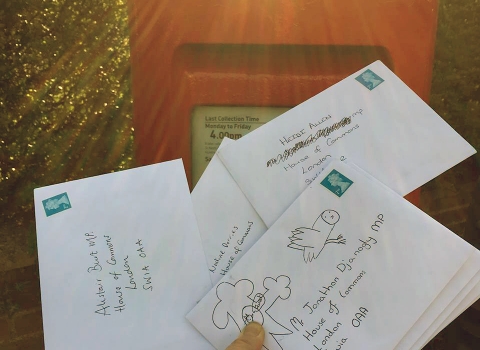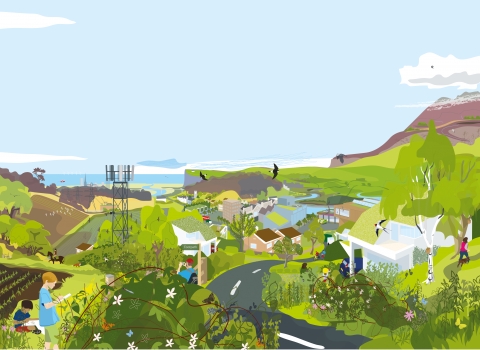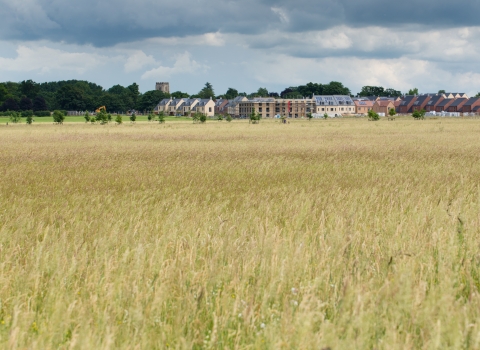A face-to-face (or online) meeting or hand crafted letter to your representative in government, outlining why nature is important to you and what you want your MP to campaign for on your behalf, has a huge impact.
One meeting with or hand crafted letter from one constituent is important, a handful shows it's an issue and a dozen or more could indicate that it's something requiring more urgent action.
Add your voice to the mix and help us achieve positive action for wildlife.
A letter from, or meeting with, you should be about what you feel strongly about, and a voice raised for nature and the environment - whatever it may specifically be about - helps to raise the profile of this cause with your representative in government.
Arranging a meeting with your MP
Meeting with your MP is a great way to get your voice heard and a better understanding of what your MP thinks about the issue, too. It doesn't have to be intimidating - MPs are just people, and they want to hear from their constituents.
Along with a coalition of other environmental charities, we are organising a mass lobby in Westminster, central London, to enable as many people as possible to meet face-to-face with their MP on one day. You can sign up to join us here, and let your MP know that The Time Is Now. We are pleased that subsidised travel to London is available from National Express.
Alternatively, you can set up a meeting by writing or sending an email to your MP. You could meet at your local nature reserve or wild space, or at their constituency office. We've got some advice for you, so you can be prepared.
What to expect
MPs want to know what it is you care about. Not only do they want to hear from you, they have a duty to listen - their job is to represent you in Parliament! MPs are generally friendly and open for a chat, but they are pressed for time so don't expect meetings to last too long. Generally appointments will last around 10-15 minutes - so make sure you've got your key messages ready.
You might find it helpful to prepare in advance and perhaps even rehearse what you want to say beforehand. It's also important to research who your MP is. Find out what they care about and whether or not they have taken an active interest in the environment before – that way you can go into the meeting fully prepared. You can find a lot of that information here. See the ‘Voting Records’ section and scroll down for information about environmental voting records.
All MP surgeries are slightly different, but in most cases you are likely to be sat in a waiting room before your appointment with people from your local area. Once it is your turn, you'll be invited into an office for your chance to persuade your MP why they should be supporting a new law for nature's recovery. You won't regret it (and to your friends, family and potential employees it sounds really impressive - so be sure to let them know!).
How can I make my meeting effective?
- Share your story: MPs love personal stories. Share yours with them, choosing experiences that have taken place in your local area and meant a lot to you. This way you can show your MP how much the natural environment in your area matters. Perhaps there are some moments shared with your Wildlife Trust or events you've attended that stand out? Can you think how even more wildlife in your area would help to improve it?
- Have a clear ask: To make your meeting as successful as possible, make sure you have some clear things to ask your MP to do for you. For example, you could ask them to write to their Party Leader e.g. Theresa May or Jeremy Corbyn, and their environment team to support an ambitious Environment Act for all the reasons we've outlined below. You can also ask them what they think they can do to help make this happen too!
- Don’t worry if you’re not an expert: It’s your MP’s job to listen to you and you will probably know far more than them - just be passionate about the issue.
- Take a photo: Ask your MP if you can take a photo with them - this is a great way to let others know that people have been speaking to them about nature’s recovery, and to encourage them to do the same. MPs often like the publicity too!
Next steps
Following up with your MP is a good way to keep your meeting fresh in their mind – sending them a quick ‘thank you’ email with the photo is a nice way of doing this.
It might also help to take brief notes on what was said in the meeting so you can remind them of anything they have committed to and hold them to it!
Top tips for meeting your MP
Writing to your MP
Here are some top tips for writing your letter, and how to find out who to send it to.
Writing your letter
- Include your name and address. They need to know you are a genuine constituent, and to have an address to send a reply to.
- Be succinct. Your letter doesn’t need to be more than two sides of A4 (in fact, we recommend it isn’t). Your letter will be clearer if you focus on one topic, e.g., The Environment Act.
- If it's your first time writing to your MP, be sure to introduce yourself with a paragraph about who you are and why you care about the wildlife in your area.
- Use the EPIC format. The acronym ‘EPIC’ is a useful way to remember how to structure the main part of your letter. After the introductory paragraph, your letter should follow this structure:
E = Engage your MP with a short summary. Get your MP’s attention with a dramatic fact or short statement. There are lots of hard-hitting facts about the decline of nature in our country, or about other causes you might be writing about:
• More than half of the UK's species are in decline;
• 44 million birds have gone from our countryside since the 1960s;
• Of the 218 countries assessed for ‘biodiversity intactness’, the UK is ranked 189, making it one of the most nature-depleted in the world;
• 97% of our flower-rich meadows have been destroyed;
Pick something that is relevant to your letter that you have personal knowledge of - or one of these - that you really care about. You can read the most recent State of Nature report for more facts and figures.
P = State the problem. Present the causes of the problem you just introduced. For example, in our campaign for a strong Environment Act we're arguing that a lack of strong legislation has allowed the destruction of nature and habitat for the sake of short economic gain.
I = Inform the MP about the solutions. If you're writing about the Environment Act, we believe a new Act will need:
• Nature Targets: legal targets for nature’s recovery that politicians must ultimately achieve and regularly report on progress towards;
• A Nature Recovery Network: a joined-up network of habitats that provide enough space for wildlife to recover and for people to thrive;
• Nature Watchdog: an independent body to help people challenge bad decisions made by Government and councils, which have a negative impact on wildlife and our natural environment.
Please do point them to our recent report ‘Towards A Wilder Britain’ here: https://www.wildlifetrusts.org/sites/default/files/2018-06/Nature_recovery_network_final.pdf The report includes ideas for specific wildlife goals which you can reference, but it’s also okay to keep it more general.
C = Call to Action. Now you need to let your MP know what you want them to do about it all.
For our Environment Act campaign, we suggest you ask them to speak to their party leaders and DEFRA teams about the Environment Act, and the issues you’ve raised. - Ask for a response. Make sure they know you want to be kept informed about this matter. However, even if you don't get a reply, your letter will be read and logged, so will still make a difference.
Let us know how it goes!
If you've received a reply, or had a meeting with your MP, we want to know how it went. Please get in touch by email on wilderfuture@wildlifebcn.org



